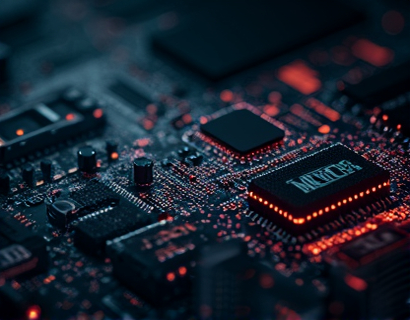Smart Contract Automation: Revolutionizing Business Payment Management
In the rapidly evolving landscape of financial technology, smart contract automation stands out as a transformative force, particularly in the realm of business payment management. This technology harnesses the power of blockchain to automate and secure the distribution of dividends, earnings, and scheduled payments. By doing so, it ensures transactions are not only secure and transparent but also highly efficient, reducing the need for intermediaries and minimizing the risk of errors or fraud.
The traditional methods of managing financial obligations are often cumbersome and prone to delays. Manual processing of payments, especially for dividends and earnings distribution, involves multiple steps and parties, each adding a layer of complexity and potential for error. Smart contract automation streamlines these processes, offering a robust solution that enhances operational efficiency and financial control for businesses.
Understanding Smart Contracts
At its core, a smart contract is a self-executing contract with the terms of the agreement directly written into code. These contracts run on a blockchain, a decentralized ledger that records all transactions across a network of computers. The code defines the rules and conditions under which the contract will execute, ensuring that all parties adhere to the agreed terms without the need for a central authority.
One of the key advantages of smart contracts is their immutability. Once deployed, the terms of the contract cannot be altered, providing a high level of trust and security. This is particularly crucial in financial transactions where trust and transparency are paramount. Smart contracts automatically execute payments when predefined conditions are met, such as the completion of a project milestone or the achievement of certain financial thresholds.
Enhancing Efficiency in Dividend Distribution
Dividend distribution is a critical aspect of corporate finance, yet it is often a source of delays and inefficiencies. Traditional methods involve multiple intermediaries, including banks and legal entities, which can lead to delays and increased costs. Smart contract automation simplifies this process by automating the entire workflow, from the calculation of dividends to their distribution.
For instance, when a company decides to distribute dividends, the smart contract can be programmed to automatically calculate the amount each shareholder is entitled to based on their ownership percentage. Once the conditions are met, such as the approval of the board of directors and the transfer of funds to a designated wallet, the smart contract executes the payment instantly and securely. This not only speeds up the process but also reduces the risk of human error and fraud.
Improving Earnings Distribution
Earnings distribution, particularly in the context of employee bonuses or performance-based incentives, can also benefit significantly from smart contract automation. Traditional methods of distributing earnings often involve complex accounting processes and manual checks, which can be time-consuming and error-prone.
With smart contracts, the distribution of earnings can be automated based on predefined criteria. For example, a smart contract can be set up to release bonuses to employees once their performance metrics are verified and recorded on the blockchain. This ensures that the distribution is fair, transparent, and immediate, enhancing employee satisfaction and motivation.
Streamlining Scheduled Payments
Scheduled payments, such as rent, salaries, and utility bills, are a recurring financial obligation for businesses. Managing these payments manually can be a tedious and error-prone task, especially when dealing with multiple parties and varying payment schedules. Smart contract automation offers a solution that simplifies and secures these transactions.
By programming smart contracts to handle scheduled payments, businesses can automate the entire process. The contract can be set to release funds to suppliers or service providers at the agreed-upon intervals, ensuring timely payments without the need for manual intervention. This not only saves time but also reduces the risk of late payments and associated penalties.
Security and Transparency
Security is a top priority in financial transactions, and smart contract automation delivers on this front. The decentralized nature of blockchain technology ensures that transaction records are immutable and tamper-proof. Each transaction is verified by multiple nodes in the network, making it extremely difficult for any single entity to manipulate the system.
Transparency is another significant benefit. All parties involved in a smart contract have access to the same version of the contract and its execution history. This level of transparency builds trust and accountability, reducing the potential for disputes and legal issues. In the context of dividend and earnings distribution, stakeholders can verify the accuracy of calculations and the timely release of funds, ensuring a high degree of confidence in the process.
Cost Savings and Operational Efficiency
The adoption of smart contract automation can lead to substantial cost savings for businesses. By eliminating the need for intermediaries such as banks and legal firms, companies can reduce transaction fees and operational costs. Additionally, the automation of repetitive tasks frees up resources, allowing employees to focus on more strategic and value-adding activities.
Operational efficiency is further enhanced as smart contracts can be integrated with other blockchain-based systems and applications. This interoperability enables seamless data flow and process automation across different business functions, creating a more cohesive and efficient operational environment. For instance, integrating smart contracts with accounting software can automate the recording of transactions, reducing the workload on accounting teams and minimizing the risk of errors.
Case Studies and Real-World Applications
Several companies have already begun to leverage smart contract technology for payment management, achieving notable success. One example is a major multinational corporation that implemented smart contracts for its global supplier payments. By automating the payment process, the company reduced transaction times from weeks to minutes and significantly lowered the risk of fraud and errors.
Another case involves a financial services firm that used smart contracts to automate the distribution of investment earnings to its clients. The firm reported a significant reduction in administrative costs and an increase in client satisfaction due to the faster and more transparent payment process.
Challenges and Considerations
While the benefits of smart contract automation are clear, there are several challenges and considerations that businesses should be aware of. One of the primary challenges is the technical complexity of implementing smart contracts. Businesses need to have a solid understanding of blockchain technology and contract programming to develop and deploy effective smart contracts.
Another consideration is the regulatory environment. As blockchain and smart contracts are relatively new, regulatory frameworks are still evolving. Companies must ensure compliance with local and international regulations, which can vary significantly across different jurisdictions. Collaborating with legal experts and staying informed about regulatory developments is crucial.
Interoperability is another area of concern. For smart contracts to be truly effective, they need to work seamlessly across different blockchain platforms and systems. While progress is being made in this area, businesses should consider the compatibility of their smart contracts with existing infrastructure and future integrations.
Future Trends and Innovations
The future of smart contract automation in payment management is promising, with ongoing innovations set to enhance its capabilities and adoption. One area of focus is the development of more user-friendly interfaces and tools that simplify the creation and management of smart contracts. This will make the technology more accessible to businesses of all sizes, not just those with extensive technical expertise.
Another trend is the integration of smart contracts with other emerging technologies, such as artificial intelligence and the Internet of Things (IoT). AI can enhance the decision-making processes within smart contracts, while IoT can provide real-time data for triggering payments, further automating and optimizing financial processes.
Additionally, the rise of decentralized finance (DeFi) platforms is opening new possibilities for smart contract automation in payment management. DeFi offers a range of financial services, including lending, borrowing, and trading, all built on blockchain technology. Smart contracts can play a central role in these platforms, enabling more complex and efficient financial transactions.
Conclusion
Smart contract automation is poised to revolutionize business payment management, offering a secure, transparent, and efficient solution for handling dividends, earnings, and scheduled payments. By automating financial obligations, businesses can reduce costs, enhance operational efficiency, and build greater trust with stakeholders. As the technology continues to evolve and mature, the potential for innovation and improvement in financial management is vast. Embracing smart contract automation is not just a strategic advantage but a necessary step for businesses looking to stay competitive in the digital age.











































